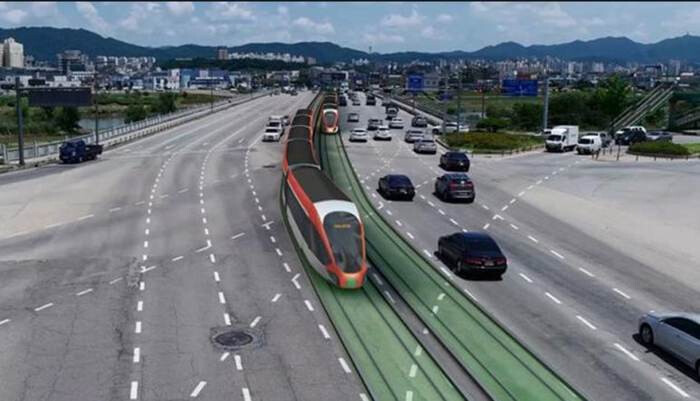Strategic Contract Allocations and Local Participation Mandates Position Project as a Model for Regional Economic Growth

Daejeon Metropolitan City has officially launched its ambitious 1.1 trillion KRW urban railway Line 2 tram construction project, a landmark initiative poised to not only revolutionize public transportation but also serve as a powerful catalyst for the region's economic resurgence. Facing a period of economic stagnation, the city government is strategically leveraging this large-scale infrastructure development to inject capital, create employment opportunities, and foster a sustainable cycle of economic growth within Daejeon.
The cornerstone of this economic revitalization strategy lies in the city's meticulous approach to contract allocation and its unwavering commitment to maximizing the participation of local businesses. Eschewing the conventional practice of awarding large, monolithic contracts, Daejeon has deliberately segmented the tram construction into 56 distinct packages. This granular division, encompassing diverse aspects such as civil engineering for underground sections and elevated bridges, mechanical and fire safety systems, intricate electrical networks, advanced signaling technologies, and comprehensive communication infrastructure, is specifically designed to broaden the scope of opportunities for small and medium-sized enterprises (SMEs) within the local construction sector.
Furthermore, the city has implemented a proactive policy to ensure substantial local involvement at every stage of the project. The bidding process explicitly mandates a minimum local firm participation rate of 49% as primary contractors, effectively leveling the playing field and providing local expertise with a significant advantage. Recognizing the multiplier effect of subcontracting, Daejeon's ordinances strongly encourage primary contractors to allocate at least 70% of subcontracted work to companies based within the metropolitan area. Demonstrating a firm commitment to this principle, the city government has pledged to actively collaborate with winning bidders to push this figure beyond 80% in practical implementation.
The commitment to local economic empowerment extends beyond direct construction contracts. In the crucial Construction Management (CM) service sector, local firms are playing a pivotal role, securing between 30% and 70% of the management contracts across various specialized areas. This ensures that local expertise is deeply embedded in the oversight and execution of the project. Notably, the waste transportation and disposal component of the project has overwhelmingly benefited local businesses, with 114 out of 116 contracts, representing over 20 billion KRW, awarded to Daejeon-based companies.
The tangible results of this localized approach are already evident. Of the 21 finalized construction contracts, valued at 230 billion KRW, local companies have spearheaded 18 as primary contractors across civil engineering, electrical, and communication works. An additional three civil engineering contracts involve local firms as integral joint venture partners. Cumulatively, local businesses have secured contracts worth 126 billion KRW, exceeding 54% of the total contracted value to date. The complete allocation of the 9 billion KRW waste disposal contracts to local firms further underscores the city's commitment to channeling project funds back into the regional economy.
Daejeon's strategy extends beyond contract awards to encompass a holistic approach to local resource utilization. The city is actively promoting the preferential use of locally sourced construction equipment and materials, ensuring that related industries within the region also benefit from the project. Moreover, the project mandates the employment of local labor, including skilled tradespeople and traffic management personnel, directly contributing to job creation within the community.
To foster a collaborative environment and ensure the effective implementation of these local participation initiatives, Daejeon City is maintaining an open dialogue with key industry stakeholders. Regular consultative meetings with prominent local construction associations, such as the Korea Construction Association and the Korea Engineering & Consulting Association, provide a platform for addressing on-the-ground challenges, gathering valuable feedback, and collectively working towards the shared goal of regional economic prosperity.
The anticipated economic impact of the tram project, as meticulously analyzed by the esteemed Korea Development Institute (KDI), paints a promising picture for Daejeon's future. The KDI's comprehensive study forecasts a substantial production inducement effect of 2.459 trillion KRW, signifying the broad economic activity generated by the project. Furthermore, it projects a value-added inducement effect of 980.8 billion KRW, reflecting the increase in the region's gross domestic product. Crucially, the analysis estimates the creation of 16,190 new jobs, a significant boost to local employment and a vital step towards economic stability and growth.
Representatives from the local construction industry have expressed considerable optimism about the project's potential. "After a prolonged period of economic downturn, the tram project has breathed new life into the local construction sector," remarked one industry leader. "We are hopeful that the increased opportunities for local companies will translate into a tangible improvement in the overall business climate and provide a much-needed boost to our local economy."
Daejeon Mayor Lee Jang-woo reiterated the city's unwavering commitment to this transformative project, stating, "The tram construction represents more than just an upgrade to our transportation infrastructure; it is a strategic investment in the future of our city and a powerful engine for regional economic recovery and sustainable development. We are dedicated to ensuring the highest standards of construction and management to maximize the positive impact on our local economy and create a more vibrant and prosperous Daejeon for all our citizens." The city's proactive and multifaceted approach to this ambitious project positions it as a potential model for other regions seeking to leverage infrastructure development for significant and sustainable economic growth.
[Copyright (c) Global Economic Times. All Rights Reserved.]






























